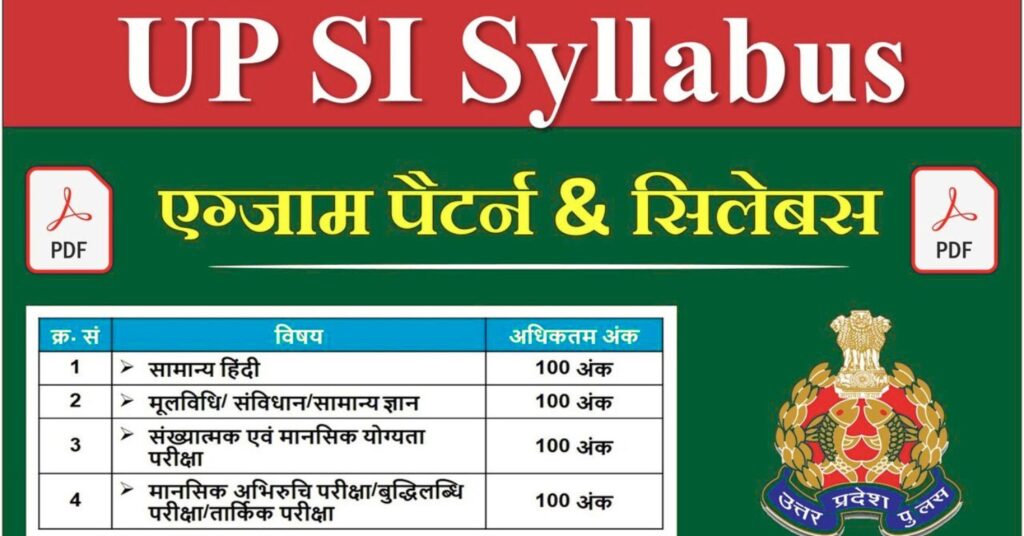The Uttar Pradesh Police has announced exciting career opportunities with 4,543 fresh openings for Sub Inspector positions across various categories. This comprehensive guide breaks down everything you need to know about the UP Police SI recruitment 2025, including detailed syllabus, exam pattern, and strategic preparation tips to help you succeed.
Key Highlights: UP Police SI Recruitment 2025
Total Vacancies: 4,543 Posts
Position Categories:
- Sub Inspector (Civil Police)
- Sub Inspector (Civil Police – Women)
- Sub Inspector/Platoon Commander (Special Security Force)
Important Dates Timeline
| Event | Date |
|---|---|
| Short Notice Release | 28 March 2025 |
| Online Application Opens | 12 August 2025 |
| Application Deadline | 11 September 2025 |
| Fee Payment Last Date | 11 September 2025 |
| Exam Date | To be announced |
| Admit Card Release | Before exam date |
Note: Always verify dates from the official UP Police website
Application Fee Structure
The application fee varies based on your category:
- General/EWS/OBC Candidates: ₹500
- SC/ST Candidates: ₹400
Payment Methods Available
- Debit Card
- Credit Card
- Internet Banking
- IMPS
- Mobile Wallet/Cash Card
Age Criteria (As on July 1, 2025)
- Minimum Age: 21 years
- Maximum Age: 28 years
- Age Relaxation: Available as per UP Police regulations
UP Police SI Exam Pattern 2025
The written examination consists of 160 questions carrying 400 marks total, with a composite time duration of 2 hours.
| Subject Area | Questions | Marks | Duration |
|---|---|---|---|
| General Hindi | 40 | 100 | 2 hours |
| Current Affairs/Basic Law/Constitution/GK | 40 | 100 | (Composite) |
| Numerical & Mental Ability | 40 | 100 | (Composite) |
| Mental Aptitude/IQ/Reasoning | 40 | 100 | (Composite) |
| Total | 160 | 400 | 2 hours |
Section-Wise Detailed Syllabus
1. General Hindi Syllabus
Core Topics Include:
- Hindi alphabet and grammar fundamentals
- Synonyms (पर्यायवाची) and antonyms (विलोम शब्द)
- Single meaning words (एकार्थी शब्द)
- Reading comprehension (अपठित बोध)
- Sanskrit-origin and modified words (तत्सम एवं तदभव)
- Prefixes and suffixes (उपसर्ग, प्रत्यय)
- Word formation and compound words (सन्धि, समास)
- Idioms and proverbs (लोकोक्तियाँ एवं मुहावरे)
- Error correction and spelling
- Grammar components: gender, number, case relations
- Literary elements: रस, छन्द, अलंकार
- Famous authors, poets, and their notable works
- Hindi language awards and recognition
2. General Knowledge & Current Affairs
Key Areas:
- India and neighboring countries
- Scientific developments and progress
- National and international awards
- Indian languages and scripts
- Literature: books and authors
- World capitals and currencies
- Sports achievements and prominent athletes
3. Law & Constitution
Essential Topics:
- Human rights and fundamental principles
- Traffic regulations and road safety
- National security concerns
- Crime and punishment principles
- Self-defense rights and legal provisions
- Constitutional framework of India
- Fundamental rights and directive principles
- Constitutional amendments overview
- All India Services structure
- Women and children protection laws
- SC/ST reservation legal framework
- Environmental and wildlife protection laws
4. Numerical Ability
Mathematical Concepts:
- Number systems and simplification
- HCF, LCM calculations
- Data interpretation: tables and graphs
- Decimals, fractions, and percentages
- Interest calculations: simple and compound
- Business mathematics: partnership, profit/loss, discount
- Time-work-distance problems
- Ratio, proportion, and mensuration
5. Mental Ability & Reasoning
Logical Skills:
- Pattern recognition in diagrams
- Symbol relationship interpretation
- Coding and decoding techniques
- Word formation tests
- Letter and number series
- Alphabetical reasoning
- Analogy and comparison
- Direction sense problems
- Data interpretation skills
- Argument analysis
6. Intelligence Quotient (IQ) Testing
Cognitive Assessment:
- Relationship analysis
- Identifying odd elements
- Series completion patterns
- Advanced coding-decoding
- Spatial reasoning
- Blood relation problems
- Alphabetical problem-solving
- Sequential timing tests
- Venn diagrams and charts
- Mathematical reasoning
7. Mental Aptitude
Professional Orientation:
- Law and order understanding
- Community harmony principles
- Crime control awareness
- Rule of law appreciation
- Professional adaptability
- Contemporary policing issues
- Basic legal knowledge
- Career interest assessment
- Mental resilience
- Sensitivity towards minorities
- Gender awareness
Selection Process Overview
The recruitment follows a multi-stage selection process:
- Written Examination (Primary screening)
- Physical Efficiency Test (PET)
- Physical Standard Test (PST)
- Document Verification
- Medical Examination
Strategic Preparation Tips
Time Management Strategy
- Allocate 2 hours efficiently across 160 questions
- Practice quick problem-solving techniques
- Develop speed in Hindi comprehension
- Master basic mathematical calculations
Subject-wise Focus Areas
- Hindi: Strengthen grammar and vocabulary
- General Knowledge: Stay updated with current events
- Numerical: Practice daily calculations
- Reasoning: Solve pattern-based problems regularly
Study Resources Recommendation
- Previous year question papers
- Current affairs magazines and newspapers
- Constitutional study materials
- Mathematical practice books
- Online mock test series
Physical Standards & Requirements
Candidates must meet specific physical standards during PET/PST rounds. These standards vary based on category and gender. Detailed requirements will be specified in the official notification.
Document Verification Checklist
Prepare these essential documents:
- Educational certificates
- Category certificates (if applicable)
- Age proof documents
- Character certificates
- Recent photographs
- Identity proofs
Important Guidelines for Success
Do’s:
- Read official notifications thoroughly
- Practice time-bound mock tests
- Stay updated with current affairs
- Maintain physical fitness
- Keep all documents ready
Don’ts:
- Ignore any syllabus section
- Depend solely on shortcuts
- Skip physical preparation
- Miss application deadlines
- Provide incorrect information
Career Prospects After Selection
UP Police Sub Inspector positions offer:
- Stable government job security
- Attractive salary packages
- Career advancement opportunities
- Social respect and recognition
- Pension and retirement benefits
| Apply Online | Click Here |
| Download Syllabus / Exam Pattern | Click Here |
| UP Police Official Website | Click Here |
Frequently Asked Questions (FAQs)
Q1: What is the negative marking pattern for UP Police SI exam? A: The official notification will specify the negative marking details. Generally, UP Police exams may have negative marking for wrong answers.
Q2: Can I change my exam center after application submission? A: Center changes are typically not allowed after application submission. Choose your preferred center carefully during registration.
Q3: Is there any relaxation in physical standards for different categories? A: Physical standard relaxations are provided as per government norms for reserved categories. Check the official notification for specific details.
Q4: How many attempts are allowed for UP Police SI exam? A: There’s no specific limit on attempts, but candidates must meet age criteria during each attempt.
Q5: What happens if I miss the written exam? A: No re-examination is conducted for absentees. Ensure you appear on the scheduled exam date.
Q6: Are there any specific books recommended for preparation? A: While no official books are recommended, focus on NCERT books for general knowledge and standard competitive exam preparation materials.
Q7: Can I apply for multiple posts simultaneously? A: You can apply for eligible posts as per the notification guidelines, but separate applications may be required.
Q8: What is the validity period of UP Police SI results? A: Results are typically valid for one year or until the next recruitment cycle, as specified in the notification.
Disclaimer: This information is compiled from publicly available sources. Always refer to the official UP Police website for the most current and accurate details regarding recruitment, syllabus, and examination patterns.
Stay Connected: Keep visiting jobsnearme.blog for the latest updates on government job opportunities and career guidance.




